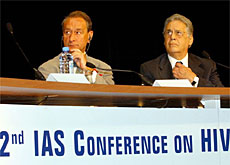Swiss research takes on the challenge of Aids
Switzerland is at the forefront of Aids research, with teams across the country searching for new ways to prevent and treat the disease.
Among them are researchers at Lausanne University Hospital who are investigating how the body responds to viral infections.
Guiseppe Pantaleo, director of the division of immunology, is examining the body’s response to viruses such as Epstein-Barr, hepatitis, influenza, as well as HIV.
“We are trying to understand how some white cells present in the blood are able to generate an effective response to the virus infection,” he told swissinfo.
“The big challenge here is that we need to understand how some cells work against the virus and we do not yet know how to stimulate the cells which we think are important in the fight against the virus.”
Over at Basel University Hospital, scientists are set to start trials aimed at rejuvenating the immune system to combat and eventually eradicate the virus.
They believe that if they can turn the immune systems of HIV/Aids patients back on, they will be able to stabilise their condition and eventually eradicate the virus from their bodies.
Side effects
Meanwhile at the University of Geneva medical school, doctors are focusing on treatment interruptions – stopping and starting drugs when necessary to reduce the side effects of indefinite treatment.
While prolonged treatment with drugs has proved very successful in reducing mortality and morbidity among HIV/Aids sufferers, the serious side effects in some patients have led researchers to investigate the possibility of interrupting treatment.
“One may ask whether it is necessary to continue treatment if the immune system has recuperated and is normal again,” said Bernard Hirschel, who heads the HIV unit at the University of Geneva.
“It may be more rational to stop treatment and then start it again when immune deficiency reappears.”
The cost of drugs – about $15,000 (SFr20,000) a year in Switzerland – is another factor in favour of this approach.
Genetic make-up
At Lausanne University, scientists have been taking advantage of the sequencing of the human genome to try to understand why some people are protected from Aids while others are extremely susceptible.
Amalio Telenti, who heads the HIV unit at Lausanne University, believes our genetic make-up is the key to any future understanding of how people can be treated.
“If we know how somebody will progress, we can anticipate specific therapies for specific interventions or even when patients should come for medical visits,” he told swissinfo.
Telenti said the greatest challenges to this approach were social and ethical rather than medical – namely overcoming society’s reluctance to explore the medical aspects of our genetic make-up.
“There are fears about knowing ahead of time everything that will ever happen to us,” he said.
swissinfo, Vincent Landon
A major conference on Aids is taking place in Paris 20 years after the discovery of the link between HIV and Aids.
UNAids says 42 million people worldwide are living with HIV/Aids.
About 70 per cent (30 million) live in sub-Saharan Africa.
The virus has killed 25 million.
UNAids predicts 70 million deaths by 2020.

In compliance with the JTI standards
More: SWI swissinfo.ch certified by the Journalism Trust Initiative











You can find an overview of ongoing debates with our journalists here . Please join us!
If you want to start a conversation about a topic raised in this article or want to report factual errors, email us at english@swissinfo.ch.